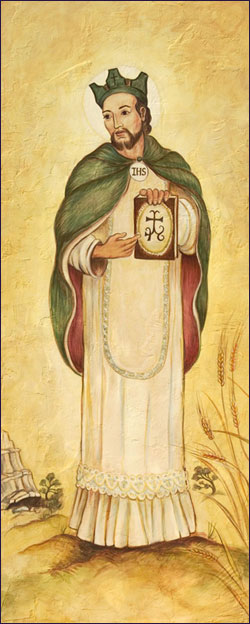![]()
Leslie McNamara
 |
St. Teresa of Avila St. Teresa, a reformed Spanish Carmelite, founded monasteries and convents and wrote perhaps the most definitive works in history of mystical prayer. Here she is shown with her eyes fixed on the Holy Spirit, whom she called “the beloved” and is symbolized by a white dove. The towers of Avila are in the background. She is dancing with tambourine and castanets to her beloved. Besides being historically accurate, this gesture is testimony to her duende—a Spanish word for the ineffable, soulful passion and mystery in Spanish music and art. The two fires are a description she used for her soul mingling with God in prayer. “Since my beloved is for me and I for my beloved who will be able to separate and extinguish two fires so enkindle?” She is next to St. Joseph for whom she had a particular devotion. |
|
St. Ignatius of Loyola St. Ignatius, founder of the Society of Jesus (the Jesuits) is shown here in typical Spanish Colonial style. The cave near Manresa where he retired in prayer for nearly a year is in the background. In this cave he began “The Spiritual Exercises,” a manual for training the soul to grow nearer to God. He is holding this book with the Jesuit symbol. The initials on his cloak refer to Christ. The foreground wheat shared with St. Maria symbolizes seeds sown by their teachings and also connects them to Kansas and to this particular Cathedral with the wheat motif. |
 |